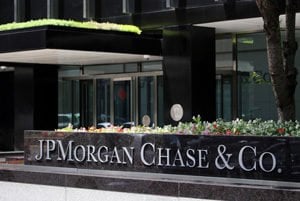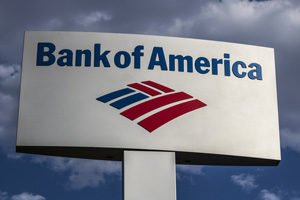Every quarter, I take the time to review the conference calls of the biggest American banks.
I don't own the stocks, of course, and in most cases, I never will.
See, I am a huge fan of small banks. And I've made an unreasonably good deal of money there.
But we all have to live in the world, and the big banks have come pretty close to blowing up that world several times during my decades in the market. I don't trust them. It's like the guy sleeping next to the elephant. You don't have to be married to the elephant, but every twitch and grunt is going to impact you severely.
Oh, these bankers talk a good game about "building trust" in "the community," but at the end of the day, they'd securitize Mongolian horse droppings, package them together with North Korean nuclear industry futures, slap a AAA rating on it, and sell that "product" to every pension fund and grandmother from sea to shining sea if they thought it would boost their return on equity by 40 basis points.
Their valuations are completely opaque, too. I remember in the 1990s, Warren Buffett said that if he were teaching a course on value investing, he'd ask the class to value an Internet company. Anyone who turned in an answer - any answer - would fail, he said.
I feel exactly the same way about these "too-big-to-fail" banks with trading operations. So many of their assets are valued at mark-to-model, or "mark-to-anyone's-best-guess," that it's impossible to tell what they're worth.
The footnotes of these banks' filings would make a rocket scientist weep.
Still... the fresh memory of the financial crisis should tell you: Every investor ignores these elephants - and the $11 trillion in assets they control - at their own peril.
[mmpazkzone name="in-story" network="9794" site="307044" id="137008" type="4"]
Here's What JPMorgan Chase Had to Say
CFO Marianne Lake does most of the talking on these calls, and she was reasonably upbeat on business conditions and the overall economy.
 She said on the call, "the third quarter was generally constructive across businesses and asset classes. Underlying business drivers grew broadly, and we maintained or gained share in a competitive environment. The U.S. and global economy continue to grow. Clients are active, with demand for credit remaining solid. That last line is critical information. Demand for credit tells us that businesses are still looking to grow and expand and are generally upbeat about the near-term future."
She said on the call, "the third quarter was generally constructive across businesses and asset classes. Underlying business drivers grew broadly, and we maintained or gained share in a competitive environment. The U.S. and global economy continue to grow. Clients are active, with demand for credit remaining solid. That last line is critical information. Demand for credit tells us that businesses are still looking to grow and expand and are generally upbeat about the near-term future."
She also talked about credit conditions. In a response to analyst questions, she commented "so I'll just start with credit for a second, because although we absolutely expect at some point that we're going to see normalization of credit, we haven't seen that yet, I just want to make that clear, that we are appropriately cautious in sharing everything, but we're not seeing any deterioration or any thematic fragility in our portfolio that we're concerned about at this point."
"Credit conditions," as Lake put it, aren't so much where the bodies are buried, but where bombs are built at the big banks. It's where they can get out of control - where they have gone out of control in the past.
It's a given that bankers will eventually try to improve returns by doing something stupid, like, say, zero-documentation reverse-amortization mortgages, or... mortgage-backed securities.
Credit weakens at the exact same rate stupidity rises - an inverse relationship - so it's something I watch like a hawk.
Lake even turned me on to a couple of investment ideas. She discussed the need for constant technology improvements and constant improvement in cybersecurity and fraud protection.
These segments are extremely "buyable," and I'm always looking to snap up plays on identity protection, cybersecurity, payment processing, and other "fintech," at the unreasonably favorable valuations I prefer.
Bank of America Feels... Not Great, but Okay
Bank of America CEO Brian Moynihan was pretty upbeat, saying, "this economic environment... still feels very constructive, consistent, with growth at 2%-plus. We expect moderate economic growth to continue this year. We [expect] the U.S. to grow a little faster next year, above 2%; and outside the U.S., growing as little in the mid-3s."
 So, the read here in the United States is (again) better, but not really great.
So, the read here in the United States is (again) better, but not really great.
Interestingly, Bank of America also said on the call that all loan categories showed growth except commercial real estate (CRE).
When asked about this, CFO Paul M. Donofrio replied, "a year ago now, if not longer, we pulled back a little bit on CRE. So, we're still servicing customers there, we're still making loans, we're just being a little bit more cautious. And so you're not seeing a lot of growth in our CRE balances."
This is important information, for a couple of reasons.
First, it's another encouraging sign that - so far - bankers are resisting their inner nature and not doing something stupid to beef up returns.
Regulators have expressed concerns about commercial real estate exposure at many banks, so this will not be the last banker to say something along these lines this earnings season.
There is also a potentially investable opportunity here. As the big banks take their foot off the commercial real estate gas pedal, other entities are stepping in. I'm going to be recommending my favorite one of these soon, and you bet it'll be at an unreasonably good price to boot.
We Hear from Everyone's Favorite Scapegoat
For many years, Wells Fargo was the best bank through which to view consumer activity.
They were "the good guys," and even during the madness that lead up to the financial crisis, Wells kept it pretty clean; the toxic loans they did have on the books were largely as a result of them bailing out what was left of Wachovia.
Of course, that's changed. Flipped 180 degrees. Today, Wells Fargo is the poster child for everything that's wrong with banking.
 But it's not quite that simple. Here's what I mean...
But it's not quite that simple. Here's what I mean...
Now, one of my favorite television series of all time is "Sons of Anarchy."
In one episode, the biker gang has to give up one of their members to be killed by a rival gang to keep the peace. A Sons member named Opie volunteers... and is beaten to death by the Sons' rivals.
In many ways, Wells Fargo... is Opie. All the horrible, awful, not-very-nice things Wells Fargo has been accused of over the past year or so have been bog-standard sales practice - business as usual - at the TBTF banks for years.
Someone had to pay to change the way big banks did business, and Wells was chosen. At least Opie got to volunteer.
So Wells Fargo's calls are a little different. They spend most of their call every quarter apologizing and talking about plans to repair blown relationships with large customers.
That's entertaining, but in spite of that, Wells Fargo is still the largest lender in the country.
So what they have to say about credit conditions and demand still matters.
The latest CEO, Timothy Sloan, was as upbeat on credit conditions as everyone else in banking today.
He told the analysts on the call, "I think that everybody in the industry, and it's certainly been, for us too, we've seen such a benign credit environment, except for the energy business, which we've all worked through. Whether you're at 27 basis points or 30 or 33, whatever the number is over the last few quarters, it's still really low. If you overlay the current economic environment, we continue to believe that losses will probably bounce around at lower levels, ex-things like the impact from the hurricanes. But overall though, the portfolio has never been in better shape in my 30 years at the company, so we continue to be optimistic."
Here Are the Most Important Takeaways
Like I said, I'll likely never own a share of one of these banks, but, by virtue of their sheer size, it's impossible to argue with their read on things.
How they read things, in other words, is how things will be.
In general, the economy's okay, but no one is expecting more robust growth in the next couple of years at least. Loan demand is keeping pace. The hurricanes and wildfires that have devastated huge swathes of the country shouldn't do significant lasting damage to the economy or the banking industry, and may in fact prove stimulative.
Banks are becoming increasingly skeptical that we see meaningful tax or regulatory reform anytime soon. I think we should be, too, and it's better that we realize it before the rest of Wall Street does.
Credit conditions are fantastic. A little too fantastic.
In fact, they are so good that every banker is looking around at every other banker, nervously wondering who will be the first to do something stupid and start loan losses moving higher.
There are some signs of weakness in auto loan portfolios, but none of these folks are losing any sleep over it, and for the moment, we shouldn't either - so long as we're keeping an eye on it.
Credit cards, too, are doing well, but that is in large part because underwriting standards are strict; if you need a credit card, you probably won't be getting it from one of the TBTF banks. In fact, the best indicator of the middle- and low-end lending market will come later this week when we see the report from Capital One (COF).
So, the consensus view among the economic field commanders is that everything is okay right now. No one's doing anything stupid yet, although you can bet they will be because they're bankers and likely can't resist forever.
What's more, interest rates are low, and they'll probably stay that way for the foreseeable future. The only risks anyone's even remotely nervous about are political and geopolitical.
And so: All clear. For now.
That's good news for us as investors. If we don't have to worry about bankers blowing up the world with stupid loans and toxic securities, we can focus on finding great companies at unreasonably good prices - and lock in the type of high long-term gains that allow us to build wealth at a rapid pace.
I'll be back soon to talk about how we can get our hands on precisely those kinds of investments.
These Trade Recommendations Are Crushing the Market
Since April 28, Shah Gilani's Zenith Trading Circle recommendations have outperformed every investment on the market, with an average gains of 44% per day (including partial plays).
In fact, one of his last trade recommendations closed out for a 995% win. And he's got seven more trade recommendations lined up right now. Have a look...
Follow Money Morning on Twitter @moneymorning, Facebook, and LinkedIn.
About the Author
Tim Melvin is an unlikely investment expert by any measure. Raised in the "projects" of Baltimore by a single mother, he never attended college and started out as a door-to-door vacuum salesman. But he knew the real money was in the stock market, so he set sights on investing - and by sheer force of determination, he eventually became a financial advisor to millionaires. Today, after 30 years of managing money for some of the wealthiest people in the world, he draws on his experience to help investors find "unreasonably good" bargain stocks, multiply profits, and build their nest eggs. Tim tirelessly works to find overlooked "hidden gems" in the stock market, drawing on the research of legendary investors like Benjamin Graham, Walter Schloss, and Marty Whitman. He has written and lectured extensively on the markets, with work appearing on Benzinga, Real Money, Daily Speculations, and more. He has published several books in the "Little Book of" Investment Series and a "Junior Chamber Course" geared towards young adults that teaches Graham's principles and techniques to a new generation of investors. Today, he serves as the Special Situations Strategist at Money Morning and the editor of Peak Yield Investor.



